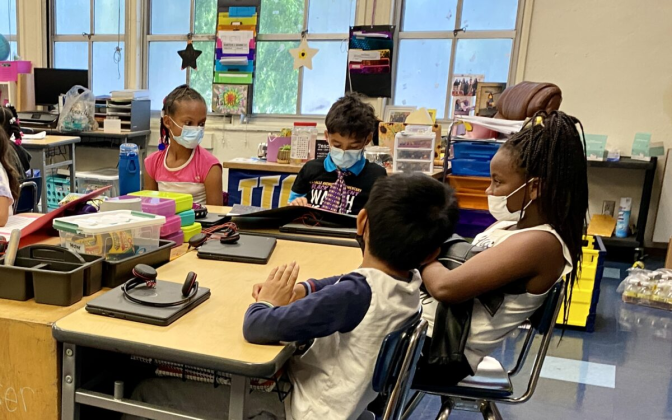This story is free to read because readers choose to support LAist. If you find value in independent local reporting, make a donation to power our newsroom today.
New Bill Would Require Media Literacy For All California Students

Recognizing fake news, being savvy about social media and resisting cyberbullying would be a required part of California school curriculum under a bill now making its way through the Legislature.
Assembly Bill 873, authored by Assemblymember Marc Berman, D-Menlo Park, would direct the state’s Instructional Quality Commission to incorporate media literacy into K-12 curriculum in English language arts, math, science, history and social studies frameworks. Eventually, all students would receive media literacy lessons every year, in every class.
“We need to make sure the next generation has the critical thinking skills and analytic skills to be discerning about what they’re bombarded with online,” Berman said. “My hope is that students talk to their parents about this, too.”
In 2018, California passed optional media literacy guidelines, which focus on teaching about online privacy and safety, conducting research online and other topics related to internet use. This bill goes further in that it addresses misinformation and social media use specifically, and would be required in classrooms.
The bill passed unanimously in the Assembly and is now in the Senate Education Committee.
Also making its way through the Legislature is a related bill, AB787, by Assemblymember Jesse Gabriel, D-Woodland Hills, which would require State Superintendent of Public Instruction Tony Thurmond to survey schools to gauge the current state of media literacy education in California, and then devise a model program to implement statewide.
But AB873, if it passes, would bring media literacy to classrooms much sooner.
“We believe these two bills, if signed into law, would bring California to the forefront of this important policy area and ensure our students are well-equipped to face the rapidly evolving digital, online landscape,” said Kami Peer, California policy manager at Common Sense Media, a nonprofit focused on youth and media.
If either or both bills pass, California would join a growing number of states that are adopting media literacy curriculum, in part due to concern about the rise of misinformation online and teenagers’ increasing use of social media. In most states, the guidelines are optional, but in a few – New Jersey, Delaware and Texas – the lessons are mandatory. In almost all cases, media literacy is taught in existing classes, but in some states it’s a stand-alone class.
Berman said he was inspired to write the bill when he learned that social media is the primary source of news for many people, including teenagers.
“Misinformation and disinformation is rampant on social media, and can lead to real-world terrifying events like Jan. 6 and the large percentage of people who believe the election was stolen,” he said.
A 2019 Stanford study found that two-thirds of students surveyed couldn’t differentiate between editorial content and advertising, and 96% didn’t understand why a climate-change website funded by a fossil fuel company might be suspect.
Alvin Lee, a sophomore at Stanford and executive director of a student advocacy group called GENup, said he was inspired to support AB873 by the plethora of fake news on social media. He recalled how his mother asked him if Hillary Clinton was indeed running a child sex trafficking operation from a Washington, D.C., pizzeria. Known as “pizzagate,” the theory has been widely discredited as fake news, but that didn’t stop his mother from momentarily believing it.
“Misinformation is so prolific on social media,” Lee said. “It’s absolutely critical that we start thinking seriously about media literacy, for the sake of democracy and the future.”
Ideally, he’d like to see schools teach more than just skills like recognizing fake news. The topic should include information literacy, as well — the ability to critically analyze all information online and in print.
Peer, at Common Sense Media, said media literacy can have broad relevance in schools at all grade levels. When students learn how to do online research, for example, they need to understand plagiarism and copyright law. When they start exploring social media, they should learn about privacy and etiquette. When they create their own TikTok videos, they need to be responsible for sharing accurate, credible information. When they study current events, they need to recognize whether a source is reliable and fair.
It’s important for schools to take on media literacy because “schools are dealing with the ramifications, including issues such as online safety, cyberbullying, privacy, hate speech, misinformation and digital distraction,” Peer said.
“Digital literacy equips students, families and school staff with the knowledge to thoughtfully navigate and safely engage with digital content,” Peer added. “It also empowers young people to analyze and assess the influence of content on their thoughts, feelings and behaviors.”
EdSource is an independent nonprofit organization that provides analysis on key education issues facing California and the nation. LAist republishes articles from EdSource with permission.







